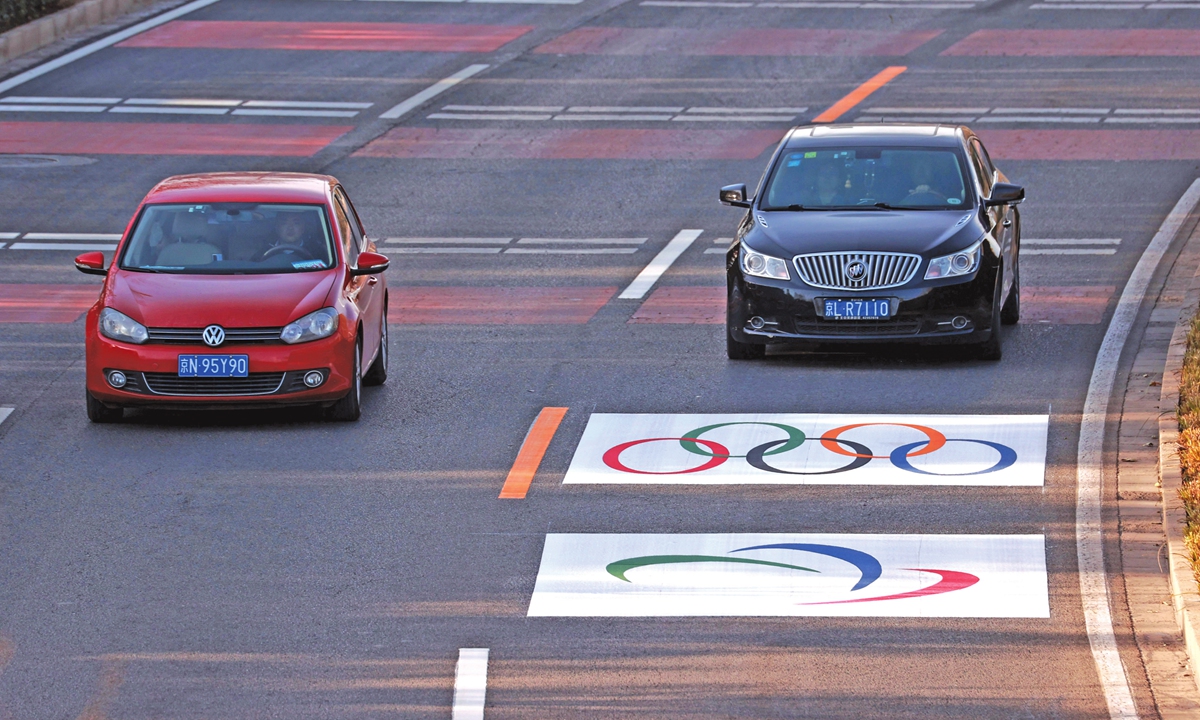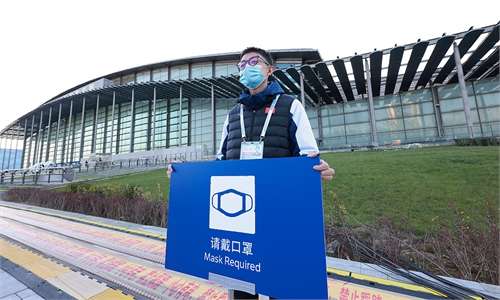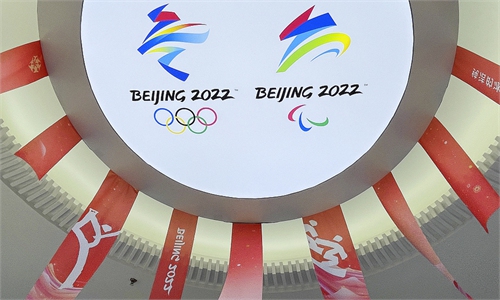Beijing confident to tackle risks of imported cases along with upcoming parcels for Winter Olympics delegations despite of simmering domestic resurgences: experts

Olympic logos are seen painted on the main traffic lanes in the city center of Beijing on Saturday. Photo: VCG
The final test of Beijing customs' epidemic-control system to manage and disinfect imported parcels has started, as the first batch of supplies for UK delegations to the Beijing Winter Olympics arrived in the Chinese capital, China Customs announced on Tuesday.
Despite the risk of imported virus cases considering the severe pandemic outside China, Chinese experts still show confidence in the country's handling the pressure of parcels flooding in along with the Olympics, noting that the country's experience in managing imported goods under the successful dynamic zero-COVID policy.
The batch of supplies from the UK delegation contains 2,086 items weighing 1,602 kilograms and it's valued at 2,147 pounds ($2,848), China Customs revealed on China's Twitter-like Sina Weibo.
It came against the backdrop where the latest COVID-19 epidemic resurgence linked to imported cases through people and goods and started from border city Manzhouli in North China's Inner Mongolia Autonomous Region has already affected four provincial-level regions including Beijing.
Nine rounds of mass nucleic acid testing conducted from November 28 to Tuesday in Manzhouli have detected 431 positive cases. By 8 am on Tuesday, the city had conducted the 10th round of test.
As the Beijing 2022 Winter Olympics approaches, more batches of supplies for various delegations will arrive in Beijing. Beijing customs has opened a green channel for these supplies to ensure fast clearance, China Customs said.
Beijing Capital International Airport is also enhancing its measures and adding equipment to handle the task of managing and disinfecting large amounts of parcels for the incoming delegations.
A maintenance corporation under the airport has developed a disinfection cabinet for handheld security checkpoints that can efficiently inactivate various kinds of viruses, bacteria and microorganisms at handheld checkpoints, which are common in venues, stations and airports, according to industry outlet caacnews.com.cn.
"The large amount of supplies that will flood in is certainly to cause a certain level of pressure for Beijing customs, but I do not think it will be difficult to handle, given China's experience in managing imported goods," a Beijing-based immunologist told the Global Times on Tuesday on condition of anonymity.
More important, all the Games-related areas, including venues and accommodations, will be put under a closed-loop management system, which avoids exchanges of items between the loop and the world outside, making it easier to manage these imported goods, the expert noted.
As the global pandemic situation remains severe and complex, all participants for the Beijing 2022 Winter Olympics and Paralympics will enter a closed-loop management system in order to prevent the possible spread of the pandemic, the organizers announced previously.
The closed-loop management system, to be implemented from January 23, 2022 until the end of the Paralympics on March 13, will cover all Games-related areas, including arrival and departure, transport, accommodation, catering, competitions, and the opening and closing ceremonies.
Within the closed-loop, participants will be allowed to move only among Games-related venues for training, competitions and work. A dedicated Games transport system will be put in place.
Wu Zunyou, chief epidemiologist of the Chinese Center for Disease Control and Prevention, also stressed the importance of the dynamic zero-COVID policy at a forum on November 28.
"There is no domestic COVID-19 patient in China in most cases. The infection source is either international arrivals or imported goods. So quarantine after arrival is the easiest and most efficient measure to identify virus carriers and prevent imported cases," Wu noted.



